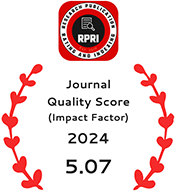Estimation of Prolactin and Some Biochemical Parameters in Some Psychotic Male Patients Treated with Risperidone in Tikrit City
DOI:
https://doi.org/10.55544/jrasb.2.2.5Keywords:
Risperidone, Prolactin, Total protein, AST, ALTAbstract
The primary purpose of this research is to examine the impact of taking risperidone by psychotic individuals on serum levels of prolactin hormone as well as a few biochemical indicators (total protein and liver enzymes AST and ALT). The experiment required collecting fifty blood samples and dividing them into two groups: the first group consisted of normal, healthy persons who served as a control. In contrast, the second group consisted of psychotic patients treated with risperidone at a dosage of two milligrams per day. The findings of this study showed that There were significant increases in total protein content at levels (P≤ 0.05) of the group 2 compared to control, and there were significant gains in liver enzymes (AST and ALT) concentration range at levels (P ≤0.05) of the second group in comparison to the control group, and there were substantial improvements increases in prolactin hormone concentrations at levels (P≤ 0.05) of the second group in compared to control.
Downloads
References
Folquitto, J. C., Barros, S. B., Pinto Junior, J. A., & Bottino, C. M. C. (2010). Efficacy and safety of brand-risperidone versus similar-risperidone in elderly patients with neuropsychiatric disorders: A retrospective study. Dementia & Neuropsychologia, 4(1), 69–74. https://doi.org/10.1590/s1980-57642010dn40100012.
Raja, M. (2009). Pharmacotherapy update: Risperidone in the treatment of schizophrenia. Clinical Medicine. Therapeutics, 1. https://doi.org/10.4137/cmt.s1123.
Bernard, V., Young, J., & Binart, N. (2019). Prolactin — a pleiotropic factor in health and disease. Nature Reviews Endocrinology, 15(6), 356–365. https://doi.org/10.1038/s41574-019-0194-6.
Saleem, M.; Martin, H. and Coates, P. (2018). Prolactin Biology and Laboratory Measurement: An Update on Physiology and Current Analytical Issues. Clin Biochem Rev 39 (1) , pp:3-16.
Aboraya, A. ; Fullen, J. E.; Ponieman, B. L. ; Makela , E. H. and Latocha , M. (2004). Hyperprolactinemia Associated with Risperidone: A Case Report and Review of Literature. Psychiatry [November] , pp:29-31.
Sabria, K. (2017). Antipsychotic-induced hyperprolactinemia. https://doi.org/10.26226/morressier.58a41cf9d462b8028d8913e9.
Kalas, M. A., Chavez, L., Leon, M., Taweesedt, P. T., & Surani, S. (2021). Abnormal liver enzymes: A review for clinicians. World Journal of Hepatology, 13(11), 1688–1698. https://doi.org/10.4254/wjh.v13.i11.1688.
Gowda, S.; Desai, P. B.; Hull, V. V.; Math, A.A K. ; Vernekar, S. N. and Kulkarni , S. S. (2009). A review on laboratory liver function tests. Pan African Medical Journal (November).
Giannini, E. G. (2005). Liver enzyme alteration: A guide for Clinicians. Canadian Medical Association Journal, 172(3), 367–379. https://doi.org/10.1503/cmaj.1040752.
Wright, T. M., & Vandenberg, A. M. (2007). Risperidone- and quetiapine-induced cholestasis. Annals of Pharmacotherapy, 41(9), 1518–1523. https://doi.org/10.1345/aph.1k145.
Qinyu , L.V. and Zhenghui ,Y. I. (2018). Antipsychotic Drugs and Liver Injury. Shanghai Archives of Psychiatry, 2018, Vol. 30, No. 1, pp:47-51.
Margari, L., Matera, E., Petruzzelli, M. G., Simone, M., Lamanna, A. L., Pastore, A., Palmieri, V. O., & Margari, F. (2015). Prolactin variations during risperidone therapy in a sample of drug-naive children and adolescents. International Clinical Psychopharmacology, 30(2), 103–108. https://doi.org/10.1097/yic.0000000000000063.
Balijepalli, C., Druyts, E., Zoratti, M. J., Wu, P., Kanji, S., Rabheru, K., Yan, K., & Thorlund, K. (2018). Change in prolactin levels in pediatric patients given antipsychotics for schizophrenia and Schizophrenia Spectrum Disorders: A network meta-analysis. Schizophrenia Research and Treatment, 2018, 1–9. https://doi.org/10.1155/2018/1543034.
Kunwar, A. R., & Megna, J. L. (2003). Resolution of risperidone-induced hyperprolactinemia with substitution of quetiapine. Annals of Pharmacotherapy, 37(2), 206–208. https://doi.org/10.1177/106002800303700208.
López-Torres, E., Süveges, Á., Peñas-LLedó, E. M., Doña, A., Dorado, P., LLerena, A., & Berecz, R. (2014). Liver enzyme abnormalities during antipsychotic treatment: A case report of risperidone-associated hepatotoxicity. Drug Metabolism and Drug Interactions, 29(2). https://doi.org/10.1515/dmdi-2013-0064.
Khorassani, F., Sousonis, F., & Lopez, L. V. (2020). Risperidone- and paliperidone-induced hepatotoxicity: a case report and literature review. American Journal of Health-System Pharmacy, 77(19), 1578–1584. https://doi.org/10.1093/ajhp/zxaa224.
Marwick, K. F. M., Taylor, M., & Walker, S. W. (2012). Antipsychotics and abnormal liver function tests. Clinical Neuropharmacology, 35(5), 244–253. https://doi.org/10.1097/wnf.0b013e31826818b6.
Downloads
Published
How to Cite
Issue
Section
License
Copyright (c) 2023 Marwa Abdulsalam Kader

This work is licensed under a Creative Commons Attribution-NonCommercial-NoDerivatives 4.0 International License.


















